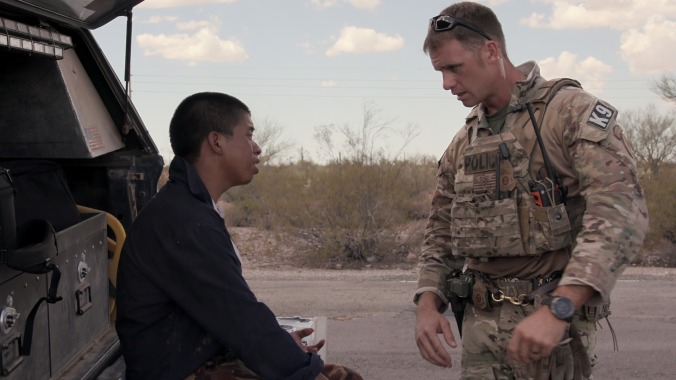The agency’s concerns about its depiction are justified in the first 10 minutes of the first episode of Immigration Nation, titled “Installing Fear.” A team of ICE agents enters an apartment building, bending the truth about whether they’re required to show their warrants or even identify themselves to the people whose homes they’ve shown up at in the middle of the night (some helpful title cards confirm they most certainly are required.) It’s April 2018—agents at ICE’s New York City field office pump themselves up for Operation “Keep Safe.” “You’re ready for war, buddy,” one agent says, approvingly, of another’s tactical gear. “I love my job,” enthuses another. Later in the same episode, a new recruit heading into the field for the first time to detain undocumented migrants says of the operation, “[It’s] Christmas for us.” This is “precision policing,” one agent huffs not long before the term “collaterals”—undocumented immigrants who are not the targets of the raid, but are nonetheless taken in to be processed for removal—is introduced by ICE officers as a kind of bonus point. Minutes later, another agent is ordered by a supervisor to “Bring at least two people in. I don’t care what you do.”
It’s hard to tell if or how the ICE agents on camera expected to play off or otherwise recontextualize any of these moments, or the hundreds of others that litter Immigration Nation. Perhaps they were put at ease by the seeming objectivity of the docuseries’ wide scope, which starts with ground-level operations and works its way up the ranks of a bureaucracy that’s nigh impenetrable. Immigration Nation is an admirable effort from Clusiau and Schwarz, the directing duo that previously worked on Trophy and Aida’s Secrets, to capture the truly labyrinthine nature of U.S. immigration policies, including enforcement tactics and the removal process (or deportation). All six hours of their docuseries overflow with information, from the personal stories of detainees—people like Josué, who migrated with his 3-year-old son, only to be separated by border patrol agents in El Paso, Texas—to data about the exponential growth of ICE and the history of immigration as a wedge issue in politics. As an ICE employee admits early on, “We are a politically driven agency.”
The first hour hits like a ton of bricks, with rapid-fire raids and the juxtaposition of the desolation on the faces of undocumented immigrants with the beaming expressions on the faces of the officers anxious to reach their quotas. Even the few reunions we do see are qualified in their joy—Erin is reunited with his young daughter after having been separated from her at the U.S.-Mexico border while seeking asylum. They board a bus to the next unknown stage in their journey; the episode ends with the camera focused on the young girl’s thousand-yard stare, a “souvenir” from her time spent in the shelter, where she says agents repeatedly told her she’d never see her father again. The third episode, “Power Of The Vote,” is the closest thing the show has to a breather, stepping back to look at policy, including the quagmire that threatens to swallow immigrants who are also U.S. Armed Forces veterans.
Like Netflix’s Living Undocumented, an illuminating docuseries about undocumented immigrants released in the relative calm of October 2019, Immigration Nation traverses states, countries, and continents in its attempt to map out the winding processes of the “right” and “wrong” ways to seek asylum and refugee status. The docuseries ventures further and further down the rabbit hole, moving from New York City and El Paso, Texas to Mecklenburg County, North Carolina, where we learn more about the 287(g) program, just one of the many ways ICE claims it “maintains vigilance.” There are antagonists to jeer at and heroes to root for: Clusiau and Schwarz meet with Bryan Cox, an ICE spokesman who describes immigration as the “big campaign” for a public affairs representative like a darkest-timeline Pete Campbell, as well as Stefania, an activist who, despite her own status as a Temporary Protection Order holder, advocates for undocumented immigrants’ rights without hesitation. The series deftly notes that exploitation is happening on both sides of the border, with for-profit prisons capitalizing on the influx of detainees and coyotes charging inordinate rates to get people into the U.S.
Immigration Nation also presents archival footage of U.S. presidents, from Bill Clinton—who more than lived up to his promise to “aggressively defend” the southern border—to Barack Obama and Donald Trump, all spouting talking points that don’t take into account just how complex the issue of immigration is. There are more Canadians who overstay their visas in the U.S. than citizens from any other country; people who overstay visas outnumber the migrants who journey to the southern border in search of refuge or opportunity. Immigration Nation doesn’t really delve into these statistics; in order to keep its narrative manageable, the docuseries primarily focuses on migration to the U.S.-Mexico border, but it proves itself the rare show that may display a little too much restraint in its runtime and coverage. The finale is more than a little rushed as a result, flying through footage of presidential addresses and the work of the Pima County, Arizona medical examiner’s office to identify bodies of migrants who fell victim to the efficacy of the Border Patrol Strategic Plan.
Not that it’s likely viewers will finish the season clamoring for more. Immigration Nation could easily serve as a litany of callous and inhumane actions taken by several presidential administrations that have only been multiplied by the current one, which has overseen an unprecedented expansion of ICE, mandating the hiring of 10,000 new officers and bumping the number of detention facilities up to 220 across 47 states. But what’s even more informative—and unnerving—is how readily ICE officers compartmentalize their feelings about the morality of their work and its legality. These agents—men and women; young and middle-aged; white, brown, and Black—all carry out the same orders, but for every one that blatantly brags about nabbing collaterals, another shrugs that they do this job “because somebody has to do it.” “Just following orders” is a common refrain, one that’s more rationalizing rhetoric than a denial. But the insights that Immigration Nation yields, which make it an essential if grueling watch, undermine “just following orders” as a defense.



 Keep scrolling for more great stories from The A.V. Club.
Keep scrolling for more great stories from The A.V. Club.